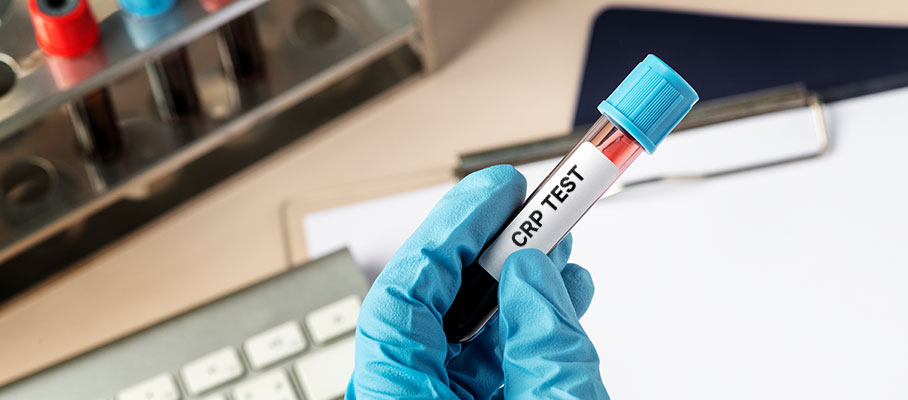Health Wellness
CRP Test (C Reactive Protein) in COVID-19: All You Need to Know

Table of Contents
CRP Test: The Basics
CRP stands for C reactive protein, which is a protein molecule made by the liver. Usually in a healthy person, the CRP levels in the blood are low. However, if there is an inflammatory condition in the body, CRP levels rise. A C reactive protein test measures the levels of CRP in the blood. This can help detect inflammation due to acute health conditions or monitor the disease severity in chronic conditions, including:
- Bacterial infections, such as sepsis
- Fungal infections
- Inflammatory bowel disease
- Autoimmune conditions like lupus or rheumatoid arthritis
The CRP test has found an important role in COVID monitoring. Got COVID-19 and caring at home? Do get your health parameters checked with our extensive COVID monitoring profile.
At times, high CRP levels may be a sign of a serious infection or other condition.
What Type of Symptoms May Warrant a CRP test?
Your doctor may advise you to get a CRP test if you have symptoms of an underlying inflammation or bacterial infection. Symptoms may include:
- Fever
- Chills
- Rapid breathing or heart rate
- Nausea and vomiting
Role of CRP Test in COVID-19
Based on worldwide data and recommendations from experts, CRP test has become a requisite for people with COVID-19 admitted in hospitals. What is most significant is that elevated levels of CRP may help in early detection of cases that can progress into severe COVID-19.
Though coronavirus is a respiratory virus that replicates in the nose, throat, and lungs, moderate or severe disease can cause hyperinflammation in the body. This dysregulated immune response can be lethal. Hence, keeping a track of inflammatory markers like CRP becomes crucial.
Normally, CRP level in blood is less than 5 mg/L. According to a study that looked at the clinical characteristics of people with COVID-19, a significantly elevated CRP levels (average 20 to 50 mg/L) were seen in COVID‐19 cases. People who had severe COVID-19 had a far elevated CRP level as compared to the people with mild disease. CRP elevations were observed in up to 86% in severe COVID‐19 cases. Another study reported that while those who had severe symptoms had on average CRP levels of 39.4 mg/L, those with mild symptoms had an average CRP levels of 18.8 mg/L. Other evidence has also shown that CRP is increased at the initial stages in the moderate or severe group than those in the mild group. The authors also observed that the chances of developing severe symptoms is increased by 5% for every one‐unit rise in CRP levels in people with COVID‐19.
High CRP levels in COVID-19 cases can indicate the need for hospitalization and advanced treatment modalities. In a study, people who died from COVID‐19 had about 10 fold higher levels of CRP than those who recovered.
C reactive protein Test can pinpoint which COVID cases should get steroids. People with low CRP levels or (no elevation in CRP levels) can be highly likely to recover with just symptomatic treatment, as seen in clinical scenarios.
How Long Does CRP Levels Take To Normalize?
Usual levels of C reactive protein in blood is less than 5 mg/L. Within 4-6 hours of the inflammatory stimulus, secretion of CRP starts rising, which doubles every 8 hours and peaks within 36 – 72 hours, and returns to normal around 3 days after the stimulus settles down. Hence, your doctor may advise you to repeat CRP after 3 days in COVID-19 if the levels in the previous CRP test were higher, to see if the infection is progressive or dwindling.
What Do The Test Results Mean?
A high level of C reactive protein means you have some type of inflammation in your body. However, a CRP test does not detect or explain the cause or location of the inflammation. Your doctor may order more tests to figure out what’s causing the inflammation. Please note that CRP levels rise in any inflammatory process, and not just COVID-19. Also, some other factors can raise your CRP levels too, such as cigarette smoking, obesity, and lack of physical activity.
Are CRP and Hs-CRP Tests the Same?
A CRP test is many times confused with a high-sensitivity-(hs) CRP test. However, they are not exactly the same.
Both these tests measure CRP levels, but are used to diagnose different conditions. An hs-CRP test measures much lower C reactive protein concentrations and is used to assess risk of heart disease.
Stay informed and take informed decisions about your health tests.

























